Don't wanna be here? Send us removal request.
Text
Hey Ben! This is a really well-balanced and thoughtful take! Even though Akira wasn’t to your personal taste, you still engaged with its deeper themes in a meaningful way. Your analysis of the political dysfunction and the Colonel’s frustration with bureaucracy is sharp, it really highlights how the film critiques leadership failures in the face of chaos.
Akira - Not My Thing
Although Akira get’s super high ratings from critics and fans alike, it’s just not my cup of tea. The visuals were bold and detailed and the animation was phenomenal, but the aesthetic of the dirty, steam punky 1980’s dystopia wasn’t appealing to me. There was lots of blood and gore, so much so that it seemed like the animators were trying to add it to as many frames as possible. Watching the scenes where the Espers were making Tetsuo hallucinate that they were giant toys, and the one where Tetsuo mutates into the giant fleshy monster with fingers coming out of fingers was like a waking nightmare.

That being said, I’ll try to comment on some social ideas that the film tackles. There is definitely some commentary on the ineffectively of government. In the film, social order is hanging on by a thread, with gangs running rampant, high instances of violent crime and mass protesting in the streets. The scene that shows the New Tokyo parliament arguing when Colonel Shikishima requests more funding for Doctor Onishi’s work with the Espers shows how deep the social disorder goes. The politicians cannot seem to agree on their priorities, one pushing to route the funding to social programs, another to the upcoming olympics. Name calling ensues while another politician casts doubt on whether Akira even caused World War III. The Colonel attempts to convince the parliament that the threats are real and quick action is required. Other members accuse the Colonel of corruption. As the disorder goes on one of the politicians is shown dozing off and another quietly sips tea. Frustrated, the Colonel finally storms off. Akira paints a picture of the challenges when there's rule by committee. For someone like the Colonel who values decisive action over deliberation, the slow moving and bickering bureaucracy is a source of frustration. In the context of the film, the scene reads as critique of weak corrupt leadership. Without someone like the Colonel to step in, powerful forces like those being developed in the Espers will get out of control. Instead of bickering over pet ideas, representatives like those in the parliament need to understand and appreciate the threat and support their counterparts, rather than nit-pick. Thus, Akira suggests that in the face of a crisis, those with authority need to unite, otherwise society risks crumbling into anarchy with the worst of the powerful filling in the gaps left over.
8 notes
·
View notes
Text
Hey Monica I loved your blog post! I especially appreciate how you framed the story as one about "relearning to live" and how each character's journey captures a different kind of grief or disorientation. Your point about stories helping us process our emotions really hit home; it’s so true that sometimes fiction gives us permission to feel what real life doesn’t.

Violet Evergarden: Recollections
This is a very interesting story which, I believe, is about relearning to live. About understanding how to move forward when the context that grounded you is gone.
Violet does not know how to live outside the context of the army or without the major.
Spencer Marlborough does not how to live after his parents' deaths.
The writer does not know how to live a life without his daughter.
Ann does not know how to live when she is facing her mother's imminent death.
It is, also, of course, about learning oneself, recognizing one's own emotions and that of others, which is what Violet is more immediately trying to learn from moment to moment. I think the way this movie frames stories, narratives, real and fictitious, as a means to reflect inward is... very accurate to my own life experience. Once, I was overtaken with a deep sadness that I could not externalize, and reading a tragedy that allowed me to cry. Sometimes, trapped in our own experience, we cannot work through our emotions, even our thoughts, and seeing them reflected back at us in another one's experience is a gift.
And in the context of the movie, of course, war underlines everything. The effects of war has on communities, on people, and on people's connections to one another. War is a context stripping machine. a connection snapper, a massive life destructing force, and it starts and ends by human choice. Exploring the effects it has on people is always a relevant practice to encourage globally, so that we might avoid it to the best of our ability. And so that we may have some idea of how to live, when we fail.
And so, of course, this movie ends with... is it recollections? Is it remembrance? The idea of a person being connected to us beyond death. The power of words and memories and the knowledge of love.
"A loved one will always watch over you."
This is truly a lovely movie.
3 notes
·
View notes
Text
Hey Sasha I love your blog post! I liked how you connected the concept of curses to emotional repression, especially within the context of Japanese culture. The way you relate Yuji’s struggles to real world issues and your own experiences makes the analysis feel personal and powerful. It really shows how anime can be both entertaining and deeply meaningful.
JJK
Jujutsu Kaisen is far more than just a standard shonen anime because it addresses many serious subjects beneath its action-heavy exterior. One important theme is how society handles negative emotions, such as fear, wrath, and grief, and how suppressing or denying them can lead to more serious issues. These feelings literally take the form of curses that hurt other people in the Jujutsu Kaisen universe. This concept resonates well with Japanese culture, where social pressure and emotional control are frequently expected, sometimes at the expense of mental health. The message is also significant on a global scale: untreated stress, pain, and negativity impact not only ourselves but also those around us.
The anime also deals with loss, sacrifice, and the idea of what it means to live a meaningful life, especially through Yuji Itadori’s personal journey. He’s constantly asking himself why he fights, what it means to protect others, and how to deal with death — all questions that feel very real today, in a world where global conflicts, pandemics, and personal tragedies are an everyday reality.
Personally, I relate to the emotional struggles in Jujutsu Kaisen. Like Yuji, I’ve sometimes felt overwhelmed by responsibilities I didn’t ask for or by trying to live up to ideals bigger than myself. His determination to find purpose even in suffering feels inspiring and strangely comforting.
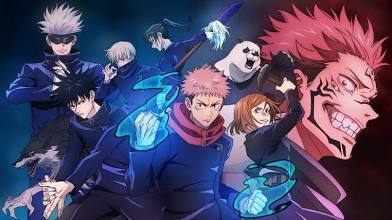
2 notes
·
View notes
Text
Jujutsu Kaisen
Episodes 25–29 of Jujutsu Kaisen dive deep into the Shibuya Incident arc, where chaos breaks loose and every character is pushed to their limit. These episodes are intense, both emotionally and visually. What stood out to me wasn’t just the action, but the deeper themes around sacrifice, responsibility, and how society treats its youth, especially those seen as “special” or powerful.
In a Japanese context, Jujutsu Kaisen reflects a cultural pressure placed on young people to live up to expectations, often at the cost of their mental health or personal lives. Characters like Yuji and Megumi are constantly forced to fight battles far bigger than themselves, something that mirrors the real life pressures Japanese youth face with academic competition, work culture, and family expectations. The series doesn’t glorify this burden, it shows the toll it takes. Watching Yuji break down under the weight of guilt and failure feels incredibly human and relatable.
Globally, this hits just as hard. We live in a world where young people are expected to fix climate change, political instability, and broken systems, all while figuring out who they are. Jujutsu Kaisen captures that overwhelming pressure and turns it into something honest, raw, and meaningful.
As a woman watching these episodes, I was drawn to Nobara Kugisaki’s role. She’s fierce, confident, and refuses to be anyone but herself. She pushes back against stereotypes about femininity and strength, which is refreshing in a genre that often sidelines women. I don’t always see myself in the battles or curses, but I do connect with the feeling of needing to prove your worth in spaces where you're underestimated. These episodes, beneath all the supernatural chaos, are really about identity, resilience, and the fight to define yourself, something I think a lot of women, myself included, understand deeply.
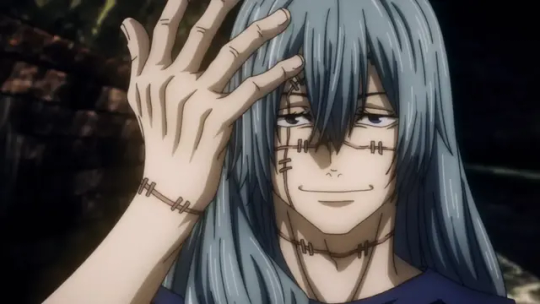

0 notes
Text
Violet Evergarden: Recollections
Violet Evergarden: Recollections is a quiet, emotional masterpiece that lingers long after the credits roll. At its heart, it’s a story about grief, healing, and the struggle to find purpose after trauma. The series follows Violet, a former child soldier, as she learns to understand human emotions and communicate love through the letters she writes for others. Watching her transformation is both heartbreaking and deeply moving.
From a Japanese cultural perspective, Violet Evergarden reflects the country's complex relationship with war, memory, and emotional expression. Japan’s postwar identity is marked by a collective effort to process the trauma of conflict and rebuild a peaceful society. Violet’s journey mirrors that process, she is not only recovering from personal loss but also grappling with her role in a violent past. Her quiet, deliberate path toward healing reflects a cultural emphasis on resilience, duty, and emotional restraint, all of which feel distinctly Japanese.
Globally, the themes in Recollections feel just as relevant. In a world still recovering from wars, pandemics, and personal losses, Violet’s story reminds us that healing isn’t linear and that empathy, connection, and storytelling are essential tools for recovery. Her letters become acts of love and closure, showing how words can mend hearts across distances and time.
As a woman, I found Violet’s journey especially powerful. She’s not a typical “strong female character” in the action oriented sense, but her emotional strength is undeniable. She starts off emotionally closed off, shaped by violence and obedience, but gradually discovers her own voice and compassion. That resonates deeply with me, especially in a world where women are often expected to be either emotionless professionals or overly nurturing. Violet finds a balance, and that, in itself, is empowering. Her story made me reflect on my own path of learning to express vulnerability as a form of strength.
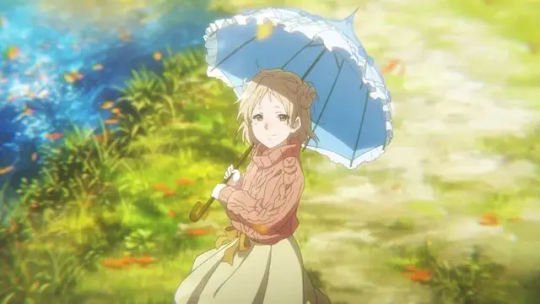

1 note
·
View note
Text
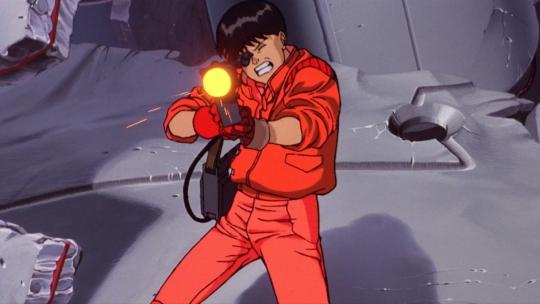
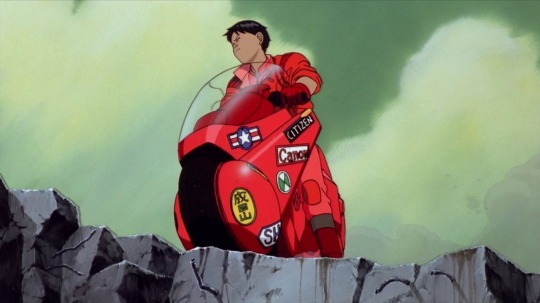
Akira
Watching Akira for the first time felt like stepping into a whirlwind of chaos, power, and dystopia. The 1988 anime film, set in a post-apocalyptic Neo Tokyo, is more than just a sci-fi action spectacle, it’s a haunting reflection of Japan’s post-war identity and the lingering trauma of destruction. The film explores themes of technological advancement gone wrong, government corruption, and the dangers of unchecked power, all of which mirror Japan’s real life anxieties following World War II and the atomic bombings of Hiroshima and Nagasaki. The decaying cityscapes and rebellious youth seem to echo a generation’s struggle to find meaning in a fractured society.
Globally, Akira resonates with today’s concerns around militarization, the ethical limits of science, and the instability of political systems. It’s unsettling how relevant the story remains, especially with modern fears surrounding artificial intelligence, genetic manipulation, and environmental collapse. The idea that power, whether governmental, technological, or psychic, can so easily spiral into destruction feels deeply timely.
As a woman, however, I found myself noticing the lack of a strong female presence in the film. Kei, the only notable female character, is brave and capable, yet her development is largely sidelined in favor of the male protagonists’ conflicts. Watching Akira made me reflect on how narratives about power and revolution often center male experiences, even when they explore universal themes. I found myself wondering how different the story might have felt if it had included a woman grappling with those same forces.
Still, Akira left a deep impact. It pushed me to think about how trauma shapes societies, and how young people, especially those marginalized or ignored, carry the weight of rebuilding. It’s a film that challenges and disturbs, and I think that’s what makes it unforgettable.
0 notes
Text
Hey Ian! I really enjoyed your take on Hetalia! You nailed how it balances humor with subtle commentary on nationalism and cultural identity. I agree, it’s not politically correct, but that’s what makes it a unique space for reflection. The satire invites conversation without being confrontational, especially around sensitive historical topics. It's rare to see a show that makes you laugh while also encouraging you to think critically about global history and stereotypes.
Hetalia
If you’ve ever wondered what it would be like if countries had personalities, wore cute outfits, and argued like siblings at a holiday dinner—Hetalia: Axis Powers is your answer. On the surface, it’s a wild, comedic take on world history where nations like Italy, Germany, Japan, and America are personified into characters with over-the-top traits. But underneath all the absurd humor, Hetalia actually taps into some surprisingly thoughtful conversations about nationalism, cultural stereotypes, and global history—especially from a Japanese perspective.
For Japan, Hetalia becomes a form of soft reflection. The character Japan is reserved, polite, and often emotionally distant—mirroring real-world cultural norms around stoicism and collectivism. The show gently pokes fun at these characteristics, offering a self-aware look at how Japan sees itself and how it thinks the world sees it. It's not a deep political analysis, but it is a safe way to bring up sensitive topics—like war, imperialism, and international relationships—without making anyone feel attacked. That’s pretty rare in anime.
Globally, Hetalia taps into shared cultural quirks and historical rivalries in a way that makes people laugh while still recognizing the weight behind them. The show doesn’t shy away from WWII or the Cold War—it just delivers them through satire. That approach opens up dialogue. It encourages viewers from around the world to reflect on their own country’s role in history without the usual defensiveness. It also shows how silly and human a lot of international conflict can be.
Is Hetalia politically correct? Absolutely not. But maybe that’s the point. It exposes how countries carry historical baggage and national pride, often to comedic extremes. And in doing so, it creates space to talk about things—colonialism, global tension, cultural bias—that still matter today. Just with a wink, a laugh, and some pasta-loving Italy in the mix.

8 notes
·
View notes
Text
Hi Tyler! I really loved your take on Your Name! You beautifully captured how the film explores empathy, identity, and connection beyond physical presence. I especially liked your point about long distance relationships, it’s so true that closeness comes from understanding, not just proximity. The Coraline comparison was also a great touch; both stories warn us about idealizing what we don’t fully know. Your reflection made me appreciate how emotionally deep the film is.
Your Name

Your Name is a reflection on fate identity, and the spiritual connection that we as humans have with one another. At its core, the "freaky-friday" esque storyline holds lessons that can be applied to real life scenario.
Mitsuha is a girl living in a satellite area who like most of us, dreams for a big city like Tokyo (in our case, New York City) and Taki is a boy living in her dream. They begin to become one another through a swap of bodies but remain as their own conscience. Similar to the film coraline, this reminded me of the sentiment to 'be careful what you wish for, because you just might get it'.
This swapping on physical body aside and remaining entity of conscience teaches the viewer off rip what it is like to walk a day in someone elses shoes. it gives these two young characters experience into a life that is not their own. Interactions, how people address them, how they are perceived through a semi-omnicient presence.
Mitsuha and Taki is emotional, with their bond built upon a sort of old-timey longing and empathy. Once they begin to live in one anothers body, their soul longs for a connection with the conscience that once housed it. They learn more about one another through consideration and curiosity than most base-line relationships go. They can see one another at their darkest points without being physically there as a separate entity. This shows us that you don't need to be right up next to someone every day in order to be close with them. This is something that a lot of people forget, as we see in our real world, their being such a stigma about long distance relationships being a waste of time.
Their relationship with one another solidifies the fact that it is not about being close to the people you love, it is about learning about them, and carrying what you've learned throughout your everyday life, thinking of them fondly. What is disheartening about this film is that Taki and Mitsuha begin to forget one another. While they forget one another, they still feel as if something is missing. It shows us that loss can affect us in vast aspects.
Overall, this anime was great. I would recommend it to friends and family.
2 notes
·
View notes
Text
Hetalia: Axis Powers
As a college student navigating the complexities of global politics and identity, watching Hetalia: Axis Powers was both entertaining and thought provoking. On the surface, it’s a quirky, light hearted anime that personifies countries as characters and turns world history, especially the World Wars, into a comedy. But beneath the satire lies a surprisingly nuanced look at nationalism, stereotypes, and international relations.
In a Japanese context, Hetalia reflects the country’s ongoing conversation with its wartime past. By presenting nations like Japan, Germany, and Italy as exaggerated but endearing characters, the show softens the darker edges of history, encouraging younger generations to engage with the past in a more accessible way. While this can be controversial, it’s also a unique attempt to humanize global conflict through humor, a method that invites reflection without heavy handed guilt or shame.
Globally, the anime raises important questions about how countries see each other, and how cultural stereotypes persist. Each character embodies traits often associated with their country: America is loud and heroic, Italy is silly and food obsessed, and Japan is quiet and reserved. It’s easy to laugh, but it also made me think critically about how much of what we "know" about other countries is shaped by caricature rather than real understanding.As a woman and a student, my connection to Hetalia is more about its themes than its plot. I’ve often felt the weight of being seen through stereotypes, whether cultural, gendered, or academic. Hetalia made me reflect on how easy it is to oversimplify complex identities, even in ourselves. Overall, Hetalia isn’t a history lesson, it’s a cultural mirror. It invites us to laugh at the absurdity of our past while asking us, subtly, to imagine a future where we take each other (and ourselves) a little more seriously.

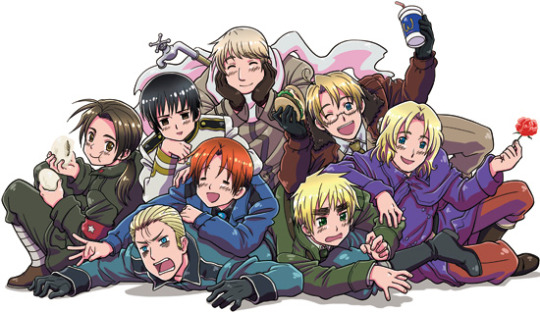
0 notes
Text
Your Name
Makoto Shinkai’s Your Name is more than a visually stunning love story, it’s a meditation on time, memory, and human connection that resonates far beyond Japan. Through the interwoven lives of Taki and Mitsuha, two teenagers inexplicably swapping bodies across time and space, the film addresses deeply rooted societal themes, locally and universally.
In Japan, Your Name touches on the country’s relationship with natural disasters, particularly the 2011 Tōhoku earthquake and tsunami. Mitsuha’s rural hometown, Itomori, mirrors communities lost to such catastrophes. The film explores the fragility of life, the trauma of loss, and the urgent need to remember and honor what came before. These ideas echo powerfully within a culture shaped by impermanence and resilience.
Globally, the movie taps into a collective sense of disconnection in a digital world. The longing to be truly seen and understood, to bridge emotional and physical distances, is something almost everyone can relate to. The film’s themes of fate, identity, and love that transcends time cut across cultural boundaries and speak to a shared human experience.On a personal level, Your Name reminded me of the quiet magic in everyday life, how we sometimes feel inexplicably drawn to people or places, as if by fate. The idea that our lives can intersect in meaningful, even miraculous ways resonates deeply. While I’ve never switched bodies with someone across time, I’ve experienced moments where I felt a powerful, almost mystical connection with someone, even if just briefly. Your Name gave me language for that feeling. Overall, Your Name is a celebration of human connection, messy, fragile, and beautiful. It encourages us to remember, to reach out, and to believe that across time, distance, and even disaster, our stories are never truly lost.
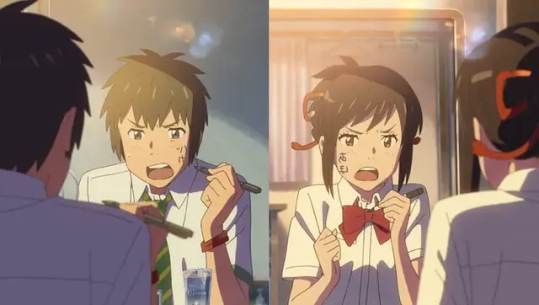
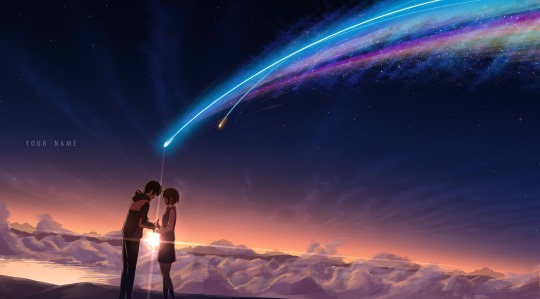
0 notes
Text
Hey Oliver I really like your blog post! I never paid much attention to its environmental critique before, but your analysis of Klaus and humanity’s disconnect from nature was eye opening. I like how you connected it to real world issues, makes the game feel way more relevant than I realized.
Blog Post: Xenoblade Chronicles 2
Compared to the anime watched prior in this course, I actually have lots of prior experience with Xenoblade Chronicles 2, and the rest of its series. The first Xenoblade Chronicles is one of my favorite games of all time, but despite starting with Xenoblade 2, nowadays I don’t give it much reverence. This is likely due to my reservations with elements of its plot, tropes, and gameplay when compared to the concrete and compelling original. Having said that, this course encouraged me to examine the game as an environmental critique, something I recognized when I first played the game, but somewhat lost as the years went by. While certain elements of it’s critique carry over into Xenoblade Chronicles 3, I must admit that this second game portrays perhaps the most environmentally conscious narrative of the series.
For a long time, I didn’t consider Xenoblade 2 objectifying anything other than its female characters. Likely a matter of definition, I didn’t process that objectification extends to the games critique of the Anthropocene and our relationship with nature. As seen in this game, and built upon in the lore of the rest of the series, the cataclysm that destroyed the old world stemmed from Klaus’ desire for control and divinity. In other words, he saw himself as above or separate from the world that humanity relied on. This disconnect from nature is an unfortunately common sentiment in the real world, which limits meaningful ecological change. Despite recognizing our increasing impact on the world around us, humanity tends to maintain a degree of separation from nature. They refuse to fully admit that they’ve become intertwined. It’s this tendency that persists in the new world Klaus creates, manifesting in continued exploitation of resources and wars over territory. Unfortunate hallmarks of the old and real world, partially stemming from an inability to live in harmony with nature.

Klaus’ decision and plan to restore the world adds interesting layers to the game’s environmental message, especially with the added context of the rest of the series. Not to get to much into the plot of the first game, but after the disaster that destroyed the old world, Klaus’ body was torn in half, as seen in this game. While his more curious and remorseful half remains in the world of Xenoblade 2, his negative desires for control manifest as another persona in a separate universe formed by the Conduit. This leads to the creation of Zanza, the villain of the first Xenoblade, and the manifestation of Klaus’ desire for control and divinity through separation. In a way, the character of Klaus/Zanza reflects the struggle of humanity in this proposed Anthropocene. We’ve amassed a great degree of control over nature, but largely thanks to at least a degree of separation from it. The fact that the more humane Klaus is left behind as the architect is important, as his guilt drives him to take action. Choosing to use his powers for good, his plan to restore the world relies on the true cooperation of humanity and nature. Using human technology to learn from and recreate nature, Klaus’ plan reflects at least the broad strokes of a potentially viable solution. With the odds of finding a new home, our own Elysium being slim, as the game suggests with its ultimate reveal, perhaps we should instead seek to recognize our true relationship to nature. Like it or not, we rely on it now as much as it relies on us.
8 notes
·
View notes
Text
Hey Sasha I love your blog post! I agree that the environmental themes in this anime are prevalent to the entire world today and Japan. Mindset is extremely important when it comes to changing the world for the better. It allows you to see many new possibilities and find the best perspective when looking for answers. This is what Nausicaä does.
Nausicaä of the Valley of the Wind.
Prior to the lecture, I found Nausicaä of the Valley of the Wind to be a very introspective and forward-thinking anime that addresses human strife, environmental degradation, and the potential for empathy and understanding to bring about healing. The anime, which is set in a post-apocalyptic world tainted by industrial warfare and overexploitation, serves as a stark warning about the perils of humanity's alienation from nature. This message is particularly pertinent in Japan and around the world today. The anime's poisonous jungles and war-torn civilizations seem to reverberate with Japan's own history of industrialization, pollution, and the fallout from atomic weapons during World War II. However, given the current global environmental issues, biodiversity loss, and climate change, these themes are also relevant outside of Japan.
What I find most compelling about the anime is how it avoids oversimplifying the conflict. Instead of portraying nature as purely good and humans as evil, it shows how fear and misunderstanding can lead to destruction. Nausicaä herself is a powerful character because she bridges both worlds—she’s human, but deeply in tune with the natural world, and she leads through compassion rather than domination. That’s a message I find personally inspiring, especially at a time when environmental issues can feel overwhelming. It reminds me that individual actions and mindset shifts can make a difference.
I can immediately see how they can relate to eco-critical theory and environmental ethics. The anime discusses issues like anthropocentrism and ecocentrism, or whether people believe they are a part of nature or its rulers. I'm interested to see how other students see the anime's balance of technology, nature, and morality, as well as how the lecture and readings develop these concepts.

1 note
·
View note
Text
Xenoblade Chronicles 2
Xenoblade Chronicles 2, developed by Monolith Soft, is much more than a typical Japanese video game anime. While it delivers a vibrant world and compelling gameplay, it also addresses complex societal issues relevant both within Japan and globally. Set in the world of Alrest, where humanity lives on the backs of dying Titans, the game explores themes of displacement, resource scarcity, and social hierarchy, all of which mirror real world concerns.
In the context of Japan, Xenoblade Chronicles 2 reflects anxieties surrounding limited natural resources and an increasingly unstable environment. The dying Titans symbolize the nation’s concerns about sustainability and over reliance on external sources for energy and food. On a broader scale, the story touches on global issues like climate change, class inequality, and the displacement of communities, themes that are especially timely given current global tensions and environmental challenges.
Personally, the game resonated with me in ways I didn’t expect. Rex, the main character, is driven by a strong sense of purpose and belief in a better future, which mirrors my own struggles as a college student trying to find direction in a chaotic world. His relationship with Pyra and the other Blades highlights the importance of connection and mutual trust, something I’ve come to value deeply in my own relationships.
What makes Xenoblade Chronicles 2 so impactful is that it doesn’t just tell a fantasy story, it uses that fantasy to engage with real issues. As someone trying to understand both myself and the world around me, I found its themes surprisingly relevant. It’s a reminder that even in a game filled with magic and monsters, the most powerful stories are the ones that reflect our own.


0 notes
Text
Nausicaä of the Valley of the Wind
Nausicaä of the Valley of the Wind, directed by Hayao Miyazaki, is a powerful film that continuously speaks to both Japan’s cultural anxieties and global environmental concerns. Set in a post-apocalyptic world where toxic jungles and giant insects dominate the landscape, the film follows Nausicaä, a young princess and environmentalist, as she tries to bridge the gap between humans and nature. Though it was released in 1984, its themes are more relevant today than ever before.
In terms of Japanese issues, the film reflects post-WWII fears of destruction and contamination, especially concerning nuclear fallout and environmental degradation. These themes align with Japan’s historical experiences, from Hiroshima and Nagasaki to more recent events like the Fukushima disaster. Globally, Nausicaä critiques humanity’s relationship with nature, warning against industrialization, war, and short-term thinking. It’s an early environmental narrative that now resonates even more strongly in a world facing climate change, deforestation, and biodiversity loss.
Personally, I found Nausicaä deeply inspiring. As someone growing up during a time when climate change is a major threat, the film made me reflect on my own habits and the role younger generations can play in shaping the future. Nausicaä’s empathy, patience, and refusal to see nature as the enemy reminded me of the importance of compassion, not only for people but for the planet. Her work reflects my major in Environmental Science very well. Watching this film made me feel hopeful but also responsible. It’s a rare story that combines beauty with a meaningful call to action, and it pushed me to think critically about the world we live in. In many ways, Nausicaä of the Valley of the Wind isn’t just a film, it’s a moral compass for our time.


1 note
·
View note
Text
The End of Evangelion
The End of Evangelion is brutal, emotional, and deeply uncomfortable. It takes everything Neon Genesis Evangelion explored about masculinity and pushes it to its breaking point. Shinji’s breakdown in the film is not just personal, it’s symbolic of a broader collapse of hegemonic masculinity. He is paralyzed by fear, guilt, and loneliness, completely unable to perform the kind of stoic, strong masculinity society expects of him. And instead of becoming the typical “hero,” he spirals.


What makes this film so intense is how it refuses to glorify masculine ideals like dominance or emotional control. Shinji’s violent outburst in the hospital scene and his complete emotional paralysis show just how toxic and destructive these expectations can be when internalized. He’s not just failing to be the “man” everyone expects; he’s realizing that image was never sustainable to begin with.
In the context of 1990s Japan, this hits hard. The country was dealing with a major economic recession, rising youth alienation, and growing mental health issues, especially among men. Globally, the film still feels relevant. Many young men are taught to repress their feelings, act tough, and avoid vulnerability. The result? Isolation, anger, and emotional detachment.
As a woman, I don’t relate to Shinji’s struggles directly, but I do recognize them. I’ve seen male friends suffer silently because they feel like showing emotion would make them “less of a man.” Watching The End of Evangelion made me reflect on how damaging these expectations can be, not just for men, but for everyone around them. The film doesn’t offer easy answers, but it forces us to confront the reality that true strength lies in vulnerability, not denial. And that message still matters.
0 notes
Text
Neon Genesis Evangelion P2
Episodes 8, 16, 24, and 26 of Neon Genesis Evangelion dig deeper into masculinity, not as a fixed identity, but as something fractured, messy, and shaped by relationships. These episodes challenge the idea that men have to be emotionally detached, strong, and independent. Instead, they highlight vulnerability, confusion, and the need for connection.
Episode 8 introduces Asuka, whose aggressive personality throws Shinji’s more passive nature into sharper focus. Her arrival puts pressure on him to perform masculinity “correctly”, to be assertive, skilled, and confident, but he continues to resist those roles. Episode 16 shows Shinji trapped inside the Eva, forced to confront his deepest insecurities. The fact that one of the most intense episodes is mostly psychological says a lot about how Evangelion values emotional depth over brute strength.
Episode 24 is especially powerful. Kaworu’s appearance brings a quiet intimacy that’s rarely seen between male characters in anime. Shinji’s connection to him isn’t about dominance or rivalry, it’s about care, understanding, and emotional openness. And in episode 26, we see Shinji’s internal world laid bare as he struggles to understand who he is without the expectations placed on him. It’s chaotic, but also freeing.
These episodes reflect real-world struggles in Japan, where men face intense pressure to conform and suppress emotion. But the themes resonate globally, rigid masculinity hurts everyone, not just those expected to live by it. As a woman, I’ve never experienced this pressure firsthand, but I’ve seen how it affects the people I care about. Watching Shinji’s journey made me more empathetic. It reminded me that healing and growth come from vulnerability. Evangelion doesn’t just break down masculinity, it rebuilds it with compassion.


1 note
·
View note
Text
Neon Genesis Evangelion P1
Watching Neon Genesis Evangelion through the lens of masculinity reveals how the show challenges traditional expectations of what it means to “be a man.” From the start, Shinji Ikari doesn’t fit the mold of the classic male hero. In episode 1, he’s not brave or bold: he’s scared, overwhelmed, and unsure of himself. This isn’t weakness, it’s a more honest portrayal of what fear and trauma actually look like.
Shinji’s hesitation to pilot the Eva shows his resistance to hegemonic masculinity. This is the expectation that men should be stoic, obedient, and emotionally numb. He doesn’t want to fight just because he’s told to. In episode 2, even though he ends up fighting the Angel, it’s not a triumphant moment. The violence leaves him shaken and confused, not empowered. Episode 4 dives even deeper into his emotional state as he runs away, questioning whether any of this is really his choice. Episode 5 contrasts him with Rei, who blindly follows orders, making Shinji’s emotional honesty stand out even more.
In Japan, the ‘90s were a time of economic downturn and identity crisis, especially for young men. The pressure to succeed and suppress emotion was intense, something still relevant worldwide today. Men everywhere are often taught to hide vulnerability, which leads to isolation and mental health struggles.
Personally, I connected with Shinji in a surprising way, not because I’ve experienced the same expectations placed on men, but because I’ve seen how those expectations affect the people around me. Watching him struggle with vulnerability, fear, and emotional expression made me reflect on how men in my own life, friends, family, even classmates, often feel like they can’t show weakness. As a woman, I’ve also felt frustrated by the way emotional openness is gendered, seen as feminine or weak, when in reality, it’s something everyone needs. These episodes made me think about how rigid gender roles hurt all of us, not just men. Seeing Shinji break down and question his place made me more empathetic, and also more aware of how important it is to create space for emotional honesty, no matter your gender. Overall, I have been enjoying the anime so far!


1 note
·
View note